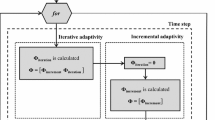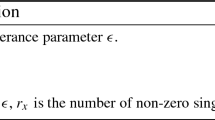Abstract
In structural engineering problems, the resulting partial differential equations (PDEs) are often solved using the finite element method (FEM). The number of degrees of freedom (DOF) and hence the computational time increases depending upon the complexity of the problem (linear/nonlinear) and discretization of space and time. The proper orthogonal decomposition (POD) yields a valuable set of vector bases which can be used in model order reduction (MOR) techniques to reduce the computational time. However, for nonlinear problems the trade-off with respect to accuracy to gain speedup is still high. In this context, we present an adaptive method to choose snapshots, which leads to a POD technique with either increased accuracy or increased speed-up for a fixed accuracy compared to the classical POD.
Access this chapter
Tax calculation will be finalised at checkout
Purchases are for personal use only
Similar content being viewed by others
References
Amsallem, D., Zahr, M.J., Farhat, C.: Nonlinear model order reduction based on local reduced order bases. Int. J. Numer. Meth. Eng. 92(10), 891–916 (2012)
Antoulas, A.C., Danny, C.S., Yunkai, Z.: On the decay rate of Hankel singular values and related issues. Syst. Control Lett. 46.5, 323–342 (2002)
Bastine, D., Vollmer, L., Wächter, M., Peinke, J.: Stochastic wake modelling based on POD analysis energies 11(3), 612 (2018)
Bolzon, G., Buljak, V.: An effective computational tool for parametric studies and identification problems in materials mechanics. Comput. Mech. 48, 675–687 (2011). https://doi.org/10.1007/s00466-011-0611-8
Chaturantabut, S., Sorensen, D.S.: A state space error estimate for POD-DEIM nonlinear model reduction. SIAM J. Numer. Anal. 50(1), 46–63 (2012)
Chatterjee, A.: An introduction to the proper orthogonal decomposition. Curr. Scir. 78(7), 808–817 (2000)
Eftang, J.L., Knezevic, D.J., Patera, A.T.: An hp certified reduced basis method for parametrized parabolic partial differential equations. Math. Comput. Modell. Dyn. Syst. 17(4), 395–422 (2011)
Haasdonk, B., Ohlberger, M.: Efficient reduced models and a posteriori error estimation for parametrized dynamical systems by offline/online decomposition. Math. Comput. Modell. Dyn. Syst. 17(2), 145–161 (2011)
Haasdonk, B.: Convergence rates of the pod-greedy method ESAIM. Math. Modell. Numer. Anal. 47(3), 859–873 (2013)
Haasdonk, B., Dihlmann, M., Ohlberger, M.: A training set and multiple bases generation approach for parameterized model reduction based on adaptive grids in parameter space. Math. Comput. Modell. Dyn. Syst. 17(4), 423–442 (2011)
Kerschen, G., Golinval, J.C., Vakakis, A., Bergman, L.: The method of proper orthogonal decomposition for dynamical characterization and order reduction of mechanical systems: an overview. Nonlinear Dyn. 41(1–3), 147–169, 2005. https://doi.org/10.1007/s11071-005-2803-2
Kunisch, K., Volkwein, S.: Proper orthogonal decomposition for optimality systems ESAIM. Math. Modell. Numer. Anal. 42(1), 1–23 (2008)
Kunisch, K., Volkwein, S.: Optimal snapshot location for computing POD basis functions ESAIM. Math. Modell. Numer. Anal. 44(3), 509–529 (2010)
Lenaerts, V., Kerschen, G., Golinval, J., Chevreuils, C.D.: Proper orthogonal decomposition for model updating of nonlinear mechanical systems. In: Golinval 2001 Mechanical Systems and Signal Processing, pp. 31–41 (2001)
Lumley, J.L., Holmes, P., Berkooz, G.: Turbulence. Coherent structures. In: Dynamical Systems and Symmetry. Cambridge University Press, Cambridge (1996)
Radermacher, A., Reese, S.: Model reduction in elastoplasticity: proper orthogonal decomposition combined with adaptive sub-structuring. Comput. Mech. 54(3), 677–687 (2014)
Radermacher, A., Reese, S.: POD—based model reduction with empirical interpolation applied to nonlinear elasticity. Int. J. Numer. Meth. Eng. 107(6), 477–495 (2016)
Reiss, J., Schulze, P., Sesterhenn, J., Mehrmann, V.: The shifted proper orthogonal decomposition: a mode decomposition for multiple transport phenomena. SIAM J. Sci. Comput. 40(3), A1322–A1344 (2018)
Sachs, E.W., Volkwein, S.: POD-Galerkin approximations in PDE-constrained optimization. GAMM-Mitteilungen 33(2), 194–208 (2010)
Tonn, T., Urban, K., Volkwein, S.: Comparison of the reduced-basis and POD a posteriori error estimators for an elliptic linear-quadratic optimal control problem. Math. Comput. Modell. Dyn. Syst. 17(4), 355–369 (2011)
Meyer, R.D., Tan, G.: Use of proper orthogonal decomposition and linear stochastic estimation technique to investigate real-time detailed airflows for building ventilation. Indoor Built Environ. 25(2), 378–389 (2016)
Nagarajan, K.K., Singha, S., Cordier, L., Airiau, C.: Open-loop control of cavity noise using proper orthogonal decomposition reduced-order model. Comput. Fluids 160, 1–13 (2018)
Penzl, T.: Eigenvalue decay bounds for solutions of Lyapunov equations: the symmetric case. Syst. Control Lett. 40.2, 139–144 (2000)
Volkwein, S., Tröltzsch, F.: POD a-posteriori error estimates for linear-quadratic optimal control problems. Comput. Optim. Appl. 44, 83115 (2009)
Acknowledgements
We would like to thank the German Research Foundation (Deutsche Forschungsgemeinschaft(DFG)) for the financial support of the SPP 1886 with the title “Polymorphic uncertainty modelling for the numerical design of structures”.
Author information
Authors and Affiliations
Corresponding author
Editor information
Editors and Affiliations
Rights and permissions
Copyright information
© 2020 Springer Nature Switzerland AG
About this paper
Cite this paper
Kastian, S., Reese, S. (2020). An Adaptive Way of Choosing Significant Snapshots for Proper Orthogonal Decomposition. In: Fehr, J., Haasdonk, B. (eds) IUTAM Symposium on Model Order Reduction of Coupled Systems, Stuttgart, Germany, May 22–25, 2018. IUTAM Bookseries, vol 36. Springer, Cham. https://doi.org/10.1007/978-3-030-21013-7_5
Download citation
DOI: https://doi.org/10.1007/978-3-030-21013-7_5
Published:
Publisher Name: Springer, Cham
Print ISBN: 978-3-030-21012-0
Online ISBN: 978-3-030-21013-7
eBook Packages: EngineeringEngineering (R0)




